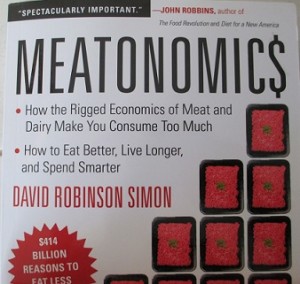Dave Simon’s Meatonomics Shows Compelling Economic Reasons to Go Plant-Based
You may be familiar with three major motives to ditch animal foods: your own health, the health of the planet, and animal suffering. To these, Dave Simon – author, lawyer, and animal advocate – adds a fourth powerful argument. His book Meatonomics builds an economic basis to move toward a plant-based diet by showing the high monetary cost to taxpayers of meat, fish, and dairy.
Meatonomics is clearly written, original, and compelling. As vegan choices become more popular and accepted, while the US economy languishes in a frail economic recovery with a dysfunctional government in Washington, Meatonomics is well-timed to ride the wave of plant-based awareness and show a $414 billion dollar hidden drain on economic activity.
If the true cost of animal foods were charged at the grocery store, the price of these items would almost triple. The animal foods industries are even significantly more costly and destructive than tobacco is. Meat, fish, and dairy are a parasitic forces sucking money from needed uses to the subsidy of illness and destruction caused by using animals for food.
Government works hand-in-hand with industry to convince consumers to eat huge amounts of health-destroying animal foods. Children are surrounded with messages to drink milk and eat meat, and in fact

The taxes you pay for supporting the meat and dairy industries would be better thrown in the trash – where at least they would not cause further damage
have little choice in most school lunches. Dietary choices solidify in adulthood to ensure that the meat, fish, and dairy industries never lack for customers.
I wanted more insight into how Meatonomics came to be written, and was fortunate to contact Dave Simon for his own story. “I used to be a classic junk-food junkie, living on chili dogs, bacon double-cheeseburgers, and sausage pizzas,” Dave told me. “I never had the slightest idea that these foods might be hurting me or the planet, or that the animals they come from might be raised in inhumane ways. Today, I’m vegan and eat only plant-based foods. I confess I still have a taste for the greasy and salty, but at least now the things I eat have no cholesterol and very little saturated fat. I try to avoid using oil in cooking or salad dressings, as I figure I get plenty of it in the prepared foods I eat.”
Dave made the choice to go plant-based in the spring of 2008. I asked him why. “One night, I watched a number of online videos about factory farming and laboratory testing. It was literally like a switch flipped in my head and I could not bring myself to continue consuming animal products. I tried one week as a vegan, and that became permanent. Incidentally, I shared my experience with a friend, who posted it on her site.” Although Dave did not go animal-free for health reasons, he did notice immediate benefits when
he changed his diet. He lost 15 pounds, dropped his cholesterol from 200 to 140, and permanently got rid of the acid reflux that had bothered him for years.
I asked Dave about his inspiration to write Meatonomics. “A few years ago, I emailed a slaughterhouse video to a friend who taught at a major law school to see what he would think of it. He wrote back that while the practices in the film were clearly inhumane, they were likely illegal – and for that reason, they were anomalies. But after doing some research, I learned that in fact, the cruel practices that show up in slaughterhouse videos are generally legal. That’s because unlike most other animals, who are protected from cruelty, farmed animals are not covered by most states’ anti-cruelty laws. For example, Connecticut makes it completely legal to “maliciously and intentionally” torture, mutilate, or kill a farmed animal. And additional laws passed at the behest of factory farmers make it hard or impossible for consumers to investigate, criticize or sue them. These laws serve only one purpose – to help factory farmers make more money.”
Dave continued, “These laws – and the behaviors they spur in producers – are responsible for a variety of social ills, including health problems, environmental damage, and classic “market failure” in the meat and dairy system. The economic forces of factory farming have not received much attention, so I thought it would make a good subject for a book.”
Were you surprised by the information you uncovered in researching Meatonomics?, I asked Dave. “Yes, I
was often surprised, and sometimes outraged,” he emphatically answered. “A number of times, I jumped up from my desk and ran into another part of the house to tell my partner about something shocking I had just learned or about a surprising calculation I had just come across.”
Here is what Dave most wants you to understand and remember from his book. “I hope readers will see that U.S. animal food producers use a variety of sophisticated techniques to make consumers buy more meat and dairy, which causes Americans to eat more meat per capita than any other people on the planet. I hope readers will learn how they’re being manipulated by factory farmers, and that, particularly in the huge quantities Americans consume these foods, meat, fish, eggs and dairy are not healthy. And finally, I hope readers will use that knowledge to reduce their consumption of animal foods – or better yet, give them up completely.”
Dave smiles in recalling how his two kitties, Boojum and Sweetpea, helped him write. “The cats often came by to visit and say “hi” when I was at the computer. Sometimes one of them decided to walk on the keyboard or lie down right on one of my hands while I was typing. They literally have minds of their own and are a constant reminder of the unique personalities and desires that every animal has, human and
non-human alike.”
Meatonomics is bold in the sweep of its economic condemnation of virtually every aspect of the animal foods industry and its vision of what should be done to move Americans toward a whole foods, plant-based diet. Dave adds, “As Gandhi said before dismantling British rule in India, “If you don’t ask, you don’t get.” Don’t ever be afraid to ask for change. Ask legislators to eliminate subsidies to animal food producers. Ask them to pass humane laws that help animals. Ask them to tell the USDA to give Americans better nutrition advice. Advocate and work for change. There’s no other way.”
If you enjoyed this post, you may want to read more about why plants are the base of the food chain.
Intrigued? Now you can use our Whole Foods Blog Finder to target informative, fun postings on whole foods, plant-based diets. Quick information at no cost!
Blog posting by Janice Stanger, Ph.D. Janice authored The Perfect Formula Diet: How to Lose Weight and Get Healthy Now With Six Kinds of Whole Foods. The book describes a healthy, whole foods, plant-based diet that can be quite economical when you select your foods wisely.
Tags: Dave Simon, environmental degradation, getting healthy, making a difference now, Meatonomics, Plant-based nutrition, whole foods plant-based diet








